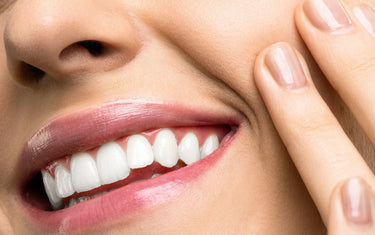3 min read / 6 June 2022 / Caitlin Devlin
How oil pulling with essential oils can improve your oral health
Learn about this ancient trick for keeping teeth and gums healthy and bacteria-free.

If you’ve ever been curious about what essential oils can do for your teeth and gums, then you may have come across the term ‘oil pulling’.
But what exactly does it mean to use oil pulling in your routine, and how can it benefit our dental hygiene?
What is oil pulling?
Oil pulling is an ancient mouthwash-like technique. It involves swishing oil around in your mouth for several minutes in order to remove harmful bacteria, neutralise bad breath, and improve oral health. The creation of oil pulling is often credited to Ayurveda, the traditional Indian system of medicine.
Why should I incorporate oil pulling into my daily routine?
At any given time, there may be up to three hundred and fifty kinds of bacteria in your mouth. Although some bacteria can be beneficial, many can cause problems such as tooth decay, gum disease, and bad breath. Oil-pulling essentially ‘pulls’ these harmful bacteria from your mouth, preventing these issues. Depending on the oils you use, oil-pulling can also help to reduce inflammation in your gums.
How do I participate in oil pulling?
- Measure out one tablespoon of carrier oil. It is important that you are using a vegetable carrier oil and not an essential oil, as essential oils are too potent for use in oil pulling without dilution. Look for oils such as coconut or sesame oil. Once you have a tablespoon of carrier oil, you may then want to add a drop of essential oil to the mixture for some extra natural benefits.
- Swill the oil around in your mouth for around 15 minutes. Take care not to swallow any.
- Spit the oil out into the bin when you are finished. Don’t spit the oil down the sink, as this may cause a blockage.
- Rinse your mouth out well with water.

Try oil pulling before or after you normally brush your teeth.
Which essential oils should I add to my carrier oil?
Adding a drop of essential oil to your carrier oil can help to more effectively eliminate bacteria, target bad breath, and even whiten teeth. Here are some essential oils that we’d recommend using when oil pulling.
Niaouli – Niaouli oil has been shown to display strong antibacterial activity against microorganisms involved in the formation of dental plaque.
Bergamot – Bergamot oil is known to reduce bacteria on the teeth and gums and leave breath smelling fresher.
Lemon – Lemon oil contains high levels of d-limonene, which prevents bacteria from building up and can naturally whiten teeth.
Pink Pepper – Pink pepper oil is an effective agent against cavity-causing bacteria and can help prevent damage to teeth.
Myrtle – Myrtle oil is antibacterial and also astringent, the latter allowing it to contract gums and strengthen their hold on teeth, preventing gaps where plaque may build up.
Tea Tree – Tea tree can attack bacteria at the back of the tongue, throat and tonsils, preventing bad breath.
Are there any risks?
Oil pulling is generally considered very safe. You should always be careful not to swallow any of the oil, as this can lead to an upset stomach, and you should also make sure that you only use a small drop of essential oil per tablespoon of carrier oil. Other than that, oil pulling has not been reported as risky to health.
It is important to remember that oil pulling should only be used on top of regular brushing and flossing, and not as a replacement.

In summary:
- Oil pulling is the practice of swilling a tablespoon of oil around your mouth before spitting it out.
- This is said to get rid of bacteria by ‘pulling’ them from the mouth.
- You may feel additional benefits by adding a drop of essential oil to your carrier oil.
- Oil pulling should never replace brushing your teeth or flossing.
Shop our essential oils here.










